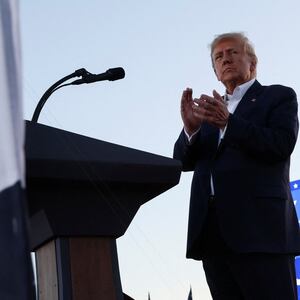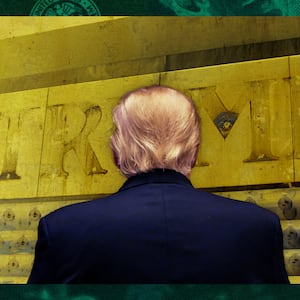The Trump Organization has suddenly switched the attorney representing its jailed former chief financial officer, Allen Weisselberg, after some folks in Trumpworld expressed concerns he was too willing to play ball with the Manhattan District Attorney investigating former President Donald Trump, according to three sources familiar with the situation.
For months, the Trump Organization paid New York City lawyer Nicholas Gravante to represent Weisselberg. But according to two people familiar with the situation who spoke with The Daily Beast on the condition of anonymity, Gravante wasn’t “Trumpy” enough to keep onboard.
Gravante, one of the city’s top criminal defense lawyers, aggressively advocated for Weisselberg last year and played a key role in securing a plea deal that helped the Trump Organization executive avoid a long sentence in state prison—by testifying at the tax fraud trial of the Trump Corporation and Trump Payroll Corporation.
Weisselberg’s lukewarm testimony wasn’t exactly friendly to Manhattan prosecutors, but it was enough to convince the jury to convict the companies, which were fined $1.6 million.
According to a source familiar with the dispute, Trump associates were bitter about Gravante’s decision to have Weisselberg meet with Manhattan prosecutors to prepare his testimony for that trial, a move they saw as being too friendly with law enforcement. This source added that Trump Organization lawyers were bothered by that arrangement and convinced Eric Trump—the Trump son who is now the executive vice president of the Trump Organization—to cut Weisselberg’s lawyer loose. The other two sources who confirmed Gravante’s departure from the case also said he was not viewed as a Trump ally.
Essentially, Gravante was so protective of Weisselberg that he was willing to have sit-downs with prosecutors to ensure the executive wouldn’t be in further legal jeopardy—even if that made the Trump Organization uncomfortable.
Susan Necheles, a defense attorney who represented the Trump Organization at that trial, countered that version of events as “completely wrong.”
“Nick made sure that Weisselberg cooperated with both the defense and the prosecution and Weisselberg’s testimony at trial was extremely helpful to the defense and hurt the prosecution,” Necheles said. “Mr. Weisselberg’s decision to change lawyers was entirely his own, a decision which I understand Mr. Weisselberg made in consultation with his family after the conclusion of the trial.”
Five people who spoke to The Daily Beast did confirm that Weisselberg is now being represented by defense lawyer Seth L. Rosenberg, who previously spent time running the rackets bureau at the very same DA’s office that is now investigating the case.
Rosenberg did not respond to a request for comment.
But even though the corporate tax fraud trial is over, Weisselberg is still in hot water over the way he handled Trump Organization property appraisals. And that makes him a primary target for local New York County prosecutors, who would benefit from having a key witness testify about those details as they pursue yet another criminal case involving Trump.
Manhattan District Attorney Alvin Bragg has a grand jury underway that could soon vote to indict the former American president for faking business records and skirting campaign finance laws. For years, local prosecutors have tried to figure out a way to criminally charge Trump himself over the way he approved paying $130,000 to the porn star Stormy Daniels in the weeks before the 2016 election to keep her quiet about their sexual affair—raunchy details that might have tanked his presidential campaign.
Trump’s longtime fixer, Michael Cohen, fronted the money and was repaid over the course of a year by the Trump Organization, so the deal was hidden as corporate expenses to an outside lawyer.
The Manhattan DA is trying to pick up the slack from the U.S. Attorney’s Office for the Southern District of New York. Federal prosecutors only pursued criminal charges against Cohen in 2018, relying partly on grand jury testimony from Weisselberg, who as Trump Organization CFO then approved the repayments.
Cohen’s memoir, Disloyal, describes how he and Weisselberg discussed the payoff in Trump Tower just weeks before the election. Cohen recalls how Weisselberg initially suggested faking business records by running an invoice through the Trump National Golf Club outside Los Angeles or selling a Mar-a-Lago membership.
“We definitely don’t want any paper trail leading back to the Boss… if the Boss pays it and signs the check, it’s like disclosing it to the world…. it needs to come from a third-party to ensure secrecy,” Weisselberg is quoted as saying.
However, Weisselberg got immunity from the feds for discussing his role, so local prosecutors can’t threaten him with criminal charges for the Stormy Daniels affair.
But Bragg’s prosecutors are trying to get him to talk anyway.
According to two people familiar with the situation and one law enforcement source, prosecutors in recent weeks have discussed applying additional pressure to Weisselberg, who is currently behind bars in the dreaded New York City jail at Rikers Island until at least April.
Investigators are looking into the possibility of pursuing a second criminal case against Weisselberg, this time accusing him of insurance fraud, according to two of those sources. As the New York Attorney General’s Office laid out in a parallel investigation that resulted in a civil lawsuit filed last year, the Trump Organization got approval from Zurich Insurance Group to obtain surety bonds—the kind that guarantee work will be performed on a business project. However, state investigators claim that Weisselberg lied to a Zurich underwriter by turning over financial statements that purported to show property appraisals were done by an outside firm—when they weren’t.
“Weisselberg’s representations to Zurich’s underwriter… were false,” the lawsuit states. “The Trump Organization did not retain any professional appraisal firm to prepare any of the valuations used for the statements; instead, the valuations were prepared by Trump Organization personnel, contrary to what Zurich’s underwriter was expressly told and believed.”
New York AG Letitia James’ investigators argue that, had Zurich known the truth, it would have given the Trump Organization a deal on less favorable terms—or questioned its relationship with the company altogether.
Manhattan DA investigators are now dangling that over Weisselberg’s head, adding additional stress to his final weeks at Rikers, according to two sources.








